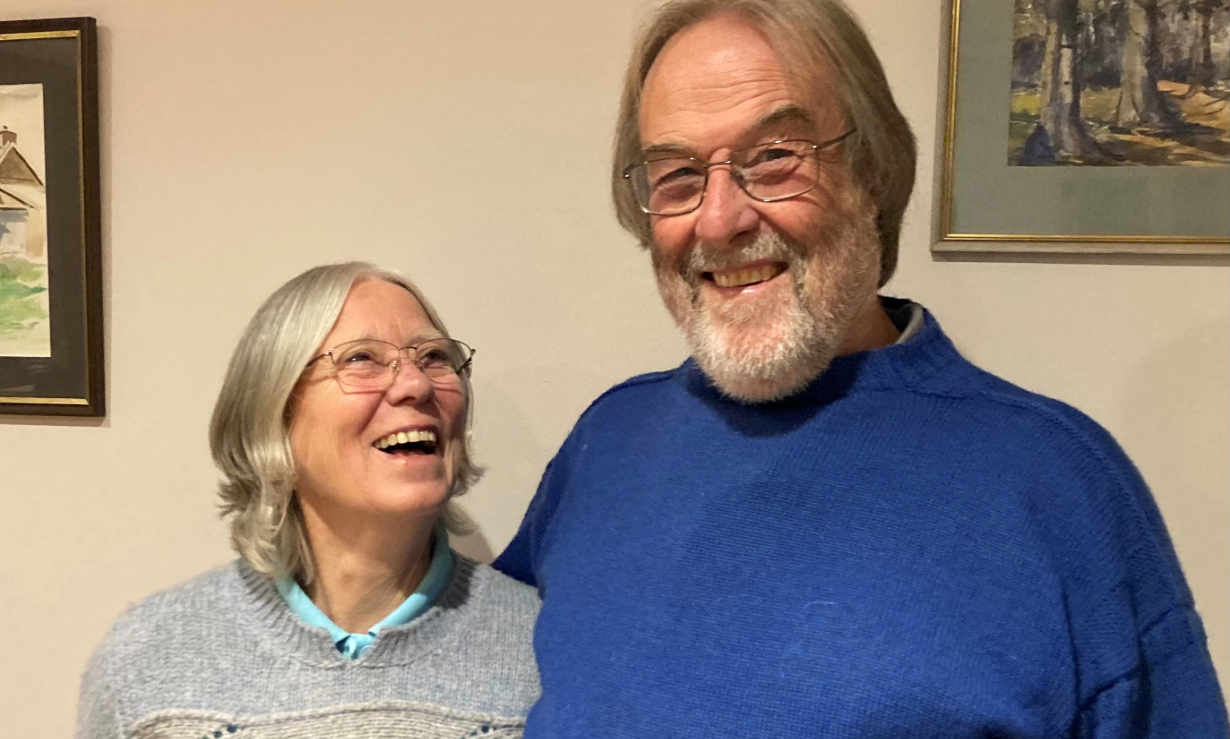David Coggon is an Emeritus Professor in the School of Medicine at the University of Southampton. After feeling unwell for a number of months, David was diagnosed with advanced kidney cancer. His health deteriorated very quickly and his prognosis was poor; at one point, it seemed he only had days to live and had begun the task of giving away his possessions.
When David started his PhD in Southampton back in 1980 he would never have guessed that one day he would be on the receiving end of innovative new treatments developed and delivered at the very same institution. Thankfully, after successful immunotherapy at University Hospital Southampton, David is now feeling fit and well, and able to enjoy his life once more.
David, a father of five who lives in Hampshire with his wife, first experienced symptoms around eighteen months before he was diagnosed with kidney cancer. He recalls feeling unusually tired, even after sleeping all night, and falling asleep again straight after breakfast. This was completely out of character for him.
David says, “I was feeling generally run down with a persistent cough, but put it down to a series of respiratory infections and then long-term effects of COVID. I was also losing weight, which was pleasing at first, but in retrospect was happening far too easily.”
However, when he then passed blood in his urine, he knew that it was time to consult his GP. He was referred for various tests and diagnosed with kidney cancer that had spread to his lung. At this point, he was seriously unwell, with severe anaemia, and needing to sit down and rest after walking up one flight of stairs.
“By the time I got the diagnosis, I was so ill that I wasn’t surprised. All I wanted to do was go home. I didn’t want to die in hospital,” David says.
An immediate response through immunotherapy
David was referred to the oncology team but did not want to spend precious time on unpleasant treatments that would have little benefit. He sought informal advice from his friend, Peter Johnson, Professor of Medical Oncology. Peter’s work has been critical in advancing cancer immunology, and he is the Cancer Mission Chair for the UK government, as well as a clinical researcher here in Southampton. Also, he had successfully treated David’s wife when she suffered with a rare cancer, some 20 years previously.
“Peter was encouraging, explaining that treatment of kidney cancer had advanced significantly in recent years,” David says, “and he convinced me that it was worth giving it a go.”
David was under the care of Dr Matthew Wheater, who advised that he should have immunotherapy, with two drugs, Ipilimumab and Nivolumab. These drugs are given by intravenous infusion, and act by increasing the activity of the body’s own immune system in recognising and killing cancer cells. The response was almost immediate.
“By the time we had the results of the biopsy to confirm my suitability for treatment, my health was so bad that I truly didn’t think I would make it through the weekend. I had lost 25kg in weight, including 5kg in the past three weeks. Thankfully, Matthew told me that I would be able to start my treatment the very next day.
“I started to feel better within four days,” David says. “I had a tingly feeling in my body, as though something was happening. I dared to hope this was a positive response and, thankfully, it was. My cough disappeared. I had energy. And I wanted to eat again.”
David’s tumours were shrinking and he is now able to enjoy a quality of life that he couldn’t have imagined before the treatment. Through immunotherapy, he has been given the gift of time.
“Over the past 12 months, I’ve gone back to living my normal life. In fact, I feel better than I have done in years!” David says. “I’m able to do heavy jobs in the garden; I did all the hedge cutting that I couldn’t do last year. I’ve decorated three rooms in our house. I’m back enjoying long walks with my wife. And we have been on holiday in France with our camper van.”
The incredible evolution of cancer treatment
David’s wife suffered from cancer a number of years ago, and he saw the impact of her treatment first-hand. She is now, thankfully, fit and well, but the treatment she underwent was very aggressive. She was given chemotherapy and radiotherapy, which can cause patients to feel sick, lose their hair, and generally feel very weak and tired.
“Cancer treatment is evolving,” David says. “My wife’s treatment was extremely unpleasant. My immunotherapy is nothing like that. I drive myself to and from the hospital, and I know I’ll feel good afterwards.”
The future of medicine
David has enjoyed a rewarding and successful career in medicine. He has advised the government on topics ranging from regulation of pesticides to health effects of outdoor air pollution, toxicity of foods, compensation for occupational diseases, and the safety of mobile phone technology. Throughout his career he has been passionate about translating scientific evidence into policies that benefit the global population.
“Medical research is so important. We don’t do it to invent a drug, but to change people’s lives, just as it has for me,” David says. “It’s exciting to think about what the future of medical research holds; the best ideas have always come from thinking outside of the box. It will be particularly fascinating to see where applications of artificial intelligence in the medical sphere can take us. Engineering is now being applied to health and delivering major improvements, for example it is used to manage diabetes, and in the design of prosthetics. There are some incredible advances.”
